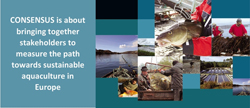Farm to fork approach for aquaculture
Many EU projects have been designed to ensure sustainable fish farming that puts good quality healthy fish on the table, while encouraging employment in the sector. The EU-funded 'Multi-stakeholder platform for sustainable aquaculture in Europe' (Consensus) project promoted food quality and safety in the field by developing a new set of sustainable aquaculture practices and protocols, developed by a wide range of stakeholders in the sector. These would enhance competitiveness, promote animal welfare, ensure biodiversity and ensure a low impact on the environment. A number of issues in aquaculture are directly related to health and safety. Apart from obligatory tracing of fish throughout its entire life-cycle to ensure fish safety, it is possible to improve nutrients such as omega-3 fatty acids, selenium and vitamins through the tailoring of fish feed. This would be accompanied by improved measurement of contaminants, as well as certification of aquaculture production and development of good practices. Sustainability is also about ensuring constant supplies as fish species become scarcer in the oceans and more expensive. Thankfully, European fish production has improved as new farmed species such as sea bass, sea bream, cod, turbot, scallops and octopus become more affordable. Consensus also examined how to monitor and combat infectious diseases that can spread rapidly in farming areas. It investigated stocking densities, free-range aquaculture and slaughter practices of farmed fish at harvest. Fish farming activity in cages produces waste materials such as uneaten feed, fish faeces and dead fish which must be managed to minimise environmental impacts and to increase productivity (and hence economic sustainability) of the farming unit. Other important issues tackled include the use of small fish as fish feed and ensuring sufficient feed supply. In parallel, the project focused on meeting consumer needs through improved production and processing technologies, reflecting a fork to farm approach based on producing fish that consumers want to buy. The principal Consensus outputs are destined to lead to new, improved standards (including perhaps a new European sustainability standard) in responsible aquaculture and upgrade the quality and safety of seafood across the continent. Consensus also produced consumer-oriented information on European aquaculture and a YouTube channel of short films of farmers giving their views on sustainability.







